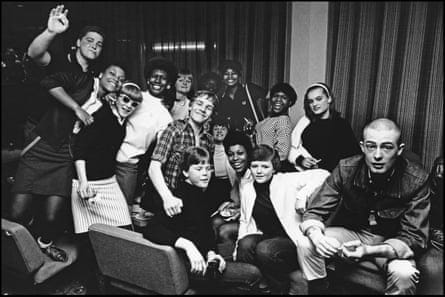Genre of the Day - 2 Tone 🇬🇧
Album of the Day - Specials by The Specials (1979)
Since last evening, I have been taken with the fun and fanciful field of astrocartography. Astrocartography posits that each individual’s astrology also helps determine places that might be favorable for them to live for certain purposes, as determined by lines spanning the globe—some north-south, others in a sweeping sine wave. For astro-skeptics, it may be a hard sell. I can’t confirm or deny its veracity, but as a student contemplating where to spend this life, it’s quite fun to contemplate the places where I might enjoy a fruitful career, find love, or undergo mystical self-development. If astrocartography can be grafted onto music genres, one might presume that certain sounds have their good fortunes written in the stars—today’s genre’s provenance is maybe less for astrological reasons than historical ones, though.
2 tone brings our head down from the constellations, down to the much less celestial United Kingdom. Its origins can be traced back to the Windrush generation, which brought thousands of Caribbean workers looking for opportunity to the UK after World War II who endured mistreatment (into the 21st century!) and racism in their journeys and acclimation. Two-tone represents a powerful union between Windfall’s second generation and white Britons based on a love for Jamaican music and the shared flippant attitude between rudeboy and punk cultures, as a lineage of genres like ska, rocksteady, and subsequently reggae began fluidly moving through the Caribbean diaspora and into the British musical landscape. Two tone was a syncretic mix, capturing a cross-racial class consciousness that the punk wave had first unleashed in response to the dreariness of urban decay and poor economic growth that beleaguered young British life.
In veering towards Jamaican music rather than the avant-garde smorgasbord post-punk chewed upon, 2 tone bands largely drew their musical basis from ska and rocksteady, a brief window of Jamaican music that which I covered almost exactly a month ago—perhaps its ephemeral moment made it hip and overdue for a revival a decade later, or the blend that rocksteady already pioneered lent itself well to the incorporation of British rock and punky twinges. The choppy guitar of ska and its danceable rhythms nicely aligned itself with the helter skelter of punk rock. In the 2 tone social context, ska’s horns operated almost as a snide parallel to disco’s gleeful brassiness, though they still provided resonant and celebratory overtones as the original ska had intended. 2 tone’s moment in the late ‘70s and early ‘80s was relatively short—ska never seems to hold the public imagination for too long, even if loyal Specials and Sublime fans remain decades past in their respective domains—but it showed the ways in a multicultural Britain fostered a thriving artistic scene, contrary to racist naysayers.
The Specials, itself an eclectic mix of young punk upstarts and seasoned ska revivalists like Rico Rodriguez who’d laid trombone on some of the earliest reggae tracks, was the apex band of 2 tone and its role as a multiracial musical moment. 1981’s “Ghost Town” is a morose yet musically jolting statement on urban life, resonating with young Britain enough to shoot to #1 on the charts. Their self-titled album actually predates that hit, but it’s still packed with sarcastic observations and rousing ska syntheses that won 2 tone fans in and beyond its times. The lulling roots reggae horns and warnings of “A Message to You Rudy” collapse into the punchy “Do the Dog,” with its legion of guitar motion and dense drumming turning the knife on factionalism and division within punk itself. “Nite Klub” features a cheeky post-disco influence and roiling bass as lead singer Terry Hall punctures any romantic visions of giving in and going out, complaining of beer that “tastes like piss.” They refuse to mince words, asserting the importance of unity and casting aside apathy most clearly on “It’s Up To You,” chanting: “It's up to you, up to you, unite / It's up to you, up to you, or fight.” The fight echoes in that gloriously spacious dub way, stretching their message beyond their moment as the need for social and musical interconnection persists.





